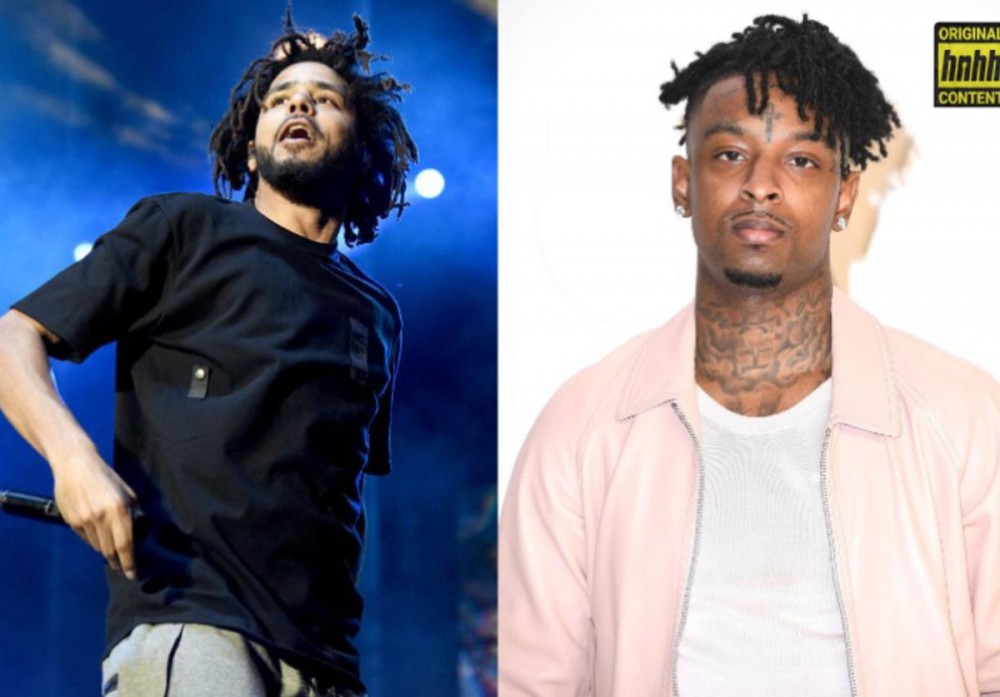The context surrounding ’s presence on 21 Savage’s I Am > I Was intro “A Lot” should not go unnoticed. One the climactic chapters his iconic feature-spree, the on-paper partnership between Cole and 21 Savage was almost as interesting in theory as in practice. There was an inherent statement made, an olive branch extended between two generations. Following the release Cole’s “1985,” it resonated all the stronger. Not to equate Savage with , but it’s not as if 21 hasn’t found himself squaring f with veteran rappers dissatisfied with the direction modern hip-hop. Lest we forget Bizzy Bone blowing dust bunnies f the blunderbuss.
Yet Cole, revered enough to secure a co-sign from on Gangstarr’s first posthumous single, willingly aligned himself with a not exactly “lyrically focused” rapper. Considering some the names that preceded 21 during Cole’s feature extravaganza — J.I.D, Royce Da 5’9”, , Rapsody, , Cozz, and come to mind — it was surprising to see him find common ground with the Savage Mode creator. It cannot be denied that a high number fans actively consider Cole to be among hip-hop’s greatest lyricists. Prior to I Am > I Was, the same number would likely place 21 in a different sport, let alone league, than Cole.

Theo Wargo/Wire/Getty s
Inversely, the unique nature 21 Savage’s self-made movement made him a surprising candidate for a Cole collaboration. First emerging from the shadows with a moody dose trap horrorcore, 21’s vivid and gruesome depictions his environment, he didn’t exactly scream social butterfly. Many casual hip-hop fans may very well have kept the monotone rapper at arm’s length, unable and perhaps unwilling to comprehend the vision. Not while the easier option would be full-blown dismissal. Yet 21’s Savage Mode quickly cultivated a gang loyal disciples, many whom appreciated the project’s conceptual merits and unapologetically murderous character. True, 21 found himself as the antagonist for those espousing lyrical values, but his distinctive style made him refreshing f the bat — if a bit an acquired taste.
When Cole and 21 eventually crossed paths in late 2019, Cole was coming f a murderous verse on J.I.D’s “Off Deez.” One that all but cemented him as a technical elite, capable adapting to even the most eclectic instrumental. A recent assist on Moneybagg Yo’s “Say Na” showcased a willingness to break character, if only to prove a point. In that sense, his triumphant duet with 21 Savage felt like the next logical step. A co-sign mutually granted by both participating parties; generational and stylistic gaps bridged over DJ Dahi and J White Did It production. Given that 21’s album title promised a celebration maturation, the instrumental seemed to encapsulate exactly that. Grounded in Atlanta tradition, resonant 808s anchor a steady drum arrangement, over which a pitch-shifted soul sample pines for a simpler time. In other words, it’s the perfect meeting ground for both 21 and Cole to not only succeed, but thrive.

Joseph Okpako/Wire/Getty s
When he said I Am > I Was, 21 Savage wasn’t exaggerating. Where earlier releases seemed to bask in brutality, his reflection on “A Lot” feels world-weary, aged from the hardships and horrors his past. “Penitentiary chances just to make a couple bucks, my heart so cold I could put it in my cup,” he raps. “Gang vs. the world, me and my dawg, it was us then you went and wrote a statement, and that really fucked me up.” His entire verse is a study in cause and effect, with 21 seeking to justify his cold demeanor as a side-effect his violent environment. “My brother lost his life and it turned me to a beast, my brother got life and it turned me to the streets,” he raps, twin tragedies in one stone’s throw. “I been through the storm and it turned me to a G / but the other side was sunny, I get paid to rap on beats.” For the first time in a minute, 21’s stance steers away from his typical brand nihilism in favor optimism — cautious, to be sure, but optimism nonetheless.
The adage real recognize real holds true for good reason. In his introductory preface, Cole explains one 21’s major selling points as an individual: the simple act bringing his kids to the studio. For Cole, it proved to be a stamp authenticity, one that reveals his principles and provides a framework for the collaboration’s creation. Though the pair have little in common on a stylistic level, their shared character traits add genuine quality to their partnership. As such, “A Lot” feels like it was crafted with care by two artists working in the same tangible space. It imbues the track–and by extension both men’s wisdom– with significance. It’s no wonder Cole is driven to speak candidly, delivering a verse that covers his own musical insecurities, his frustrations with the record industry, and his take on the slippery slope that is the court public opinion.
Despite the stylistic differences, or perhaps because them, “A Lot” stands as a truly great hip-hop duet. One written by two men at the height their artistry, having survived years worth hard-fought experience. Though their respective paths through life and music are lined with differences, few can credibly question 21 nor Cole’s authenticity as narrators.
